In spring 2010, we watched as each cohort of students reached career milestones — participating in the School’s inaugural retreat as moderators and presenters, preparing to select a thesis mentor after completing the Gerstner Sloan Kettering Core Course, declaring dissertation research, partnering with a clinical mentor, and continuing dissertation research.
Inaugural Retreat
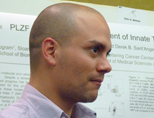
Student Moderator and Presenter Eric Alonzo
Gerstner Sloan Kettering held its inaugural retreat, on April 30 and May 1, to foster scientific and personal exchanges between students and faculty. The retreat brought together 32 students and 28 faculty members, as well as school leadership and keynote speakers for two days filled with science, networking, lively discussions, and fun. The retreat was held at Mohonk Mountain House in New Paltz, NY.
One faculty member summed up the impact of the retreat: “It was awesome. The students were superb. And the program nurtured meaningful interactions among attendees — both students and faculty.”
- View retreat program to learn more.
- See slide show of the formal and informal aspects of the retreat.
Three Students — Eric Alonzo, Karen Hunter, and John Maciejowski — were session moderators. These three students joined eight other students to present their research to fellow retreat participants.
Student Presenters

Eric Alonzo
Presentation:
Aligning pathways towards an integrated map of cellular processes
Mentor:
Derek Sant’Angelo

James Dowdle
Presentation:
Mouse SPO11 interacting partners: In search of meiotic double-strand break proteins
Mentor:
Scott Keeney

Nicholas Gauthier
Presentation:
Combinatorial perturbations of GBM tumorspheres
Mentor:
Chris Sander

Yvonne Gruber Mica
Presentation:
Directed differentiation and prospective isolation of human embryonic stem cell derived melanocytes
Mentor:
Lorenz Studer

Karen Hunter
Presentation:
The role of heparanase in promoting tumor progression in the RIP1-Tag2 model of pancreatic islet carcinogenesis
Mentor:
Johanna Joyce

John Maciejowski
Presentation:
The MPS1 protein kinase controls the cytosolic and kinetochore-resident branches of the spindle checkpoint in human cells
Mentor:
Prasad Jallepalli

Alexandria Miller
Presentation:
Structural studies and characterization of a eukaryotic two-pore domain potassium channel
Mentor:
Stephen Long

Semanti Mukherjee
Presentation:
Evaluating statistical power of shared controls in genome wide association studies
Mentor:
Robert Klein

Jeffery Smith
Presentation:
The role of Rho GTPases in breast cancer invasion and proliferation
Mentor:
Alan Hall

Dimiter Tassev
Presentation:
Targeting neuroblastoma using a GD2-specific scFv-Fc fusion protein
Mentor:
Nai-Kong Cheung

Shannon Yu
Presentation:
Cellular and molecular events regulating myoblast fusion in mammals
Mentor:
Mary Baylies
Our First-Year Students
Our current first-year students arrived on July 27, 2009, and during their first laboratory rotation began laying the foundation for developing a dissertation. After five weeks of bench work, they entered the classroom to tackle the core course, taking breaks from this didactic phase of the curriculum to return to bench work for two more laboratory rotations during the year. Added to this rigorous schedule, students made four visits to the clinic to observe physicians caring for patients, participated in the President’s Research Seminar Series Journal Club, and attended the Graduate Student Seminar in which students in the second year and beyond gave talks on their research. At the end of each laboratory rotation period, students gave ten-minute talks on their rotation projects.
This intense first-year curriculum prepares students to select a thesis mentor and transition to full-time research at the beginning of their second year. Here four of our first-year students reflect on the impact of the core curriculum on their careers.
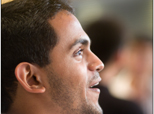
The intensity and structure of the core course were such that it constantly forced me to think about science in new ways, encouraging me to ask relevant scientific questions, make intelligent hypotheses, and design elegant experiments to test these hypotheses. These and others skills acquired over the past year will no doubt go a long way in shaping my scientific career. Learning from experts in their respective fields was an added bonus. Overall, I’m extremely satisfied with my decision to come to Gerstner Sloan Kettering and would encourage any future students interested in being involved with cutting-edge research to do the same.
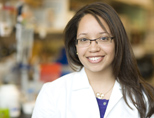
As the time to choose a laboratory in which to conduct my dissertation project approaches, I feel confident that the Gerstner Sloan Kettering Core Course has set the framework for me to be analytical and thoughtful. The diverse topics of the journal discussion not only broadened my knowledge base but also emphasized the importance of taking an integrative approach to biological questions. Most importantly, through the clinical rotations I’ve learned the importance of integrating the translational aspect of science with the daily basic biology in the laboratory to advance treatment of human malignancies. I feel excited and privileged to be part of this amazing community.
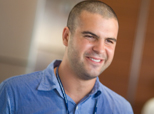
Coming to Memorial Sloan Kettering for my graduate education has been a great decision. While looking at other programs, I found many of them to be too narrow in focus, and while I considered MD-PhD programs the time commitment was daunting. I saw the Gerstner Sloan Kettering program as one where I could learn how to approach a biological question from all angles and disciplines and not get caught in the limited perspective of a defined field of study. Furthermore, the opportunity at Gerstner Sloan Kettering to interact with so many world-class physicians while developing a solid basic scientific foundation seemed like the best preparation for my career goal of studying human disease at the bench. In this regard the program has completely met my expectations, has given me a sense of purpose, and has potentially saved me four years of further schooling! I have found Memorial Sloan Kettering to be the most cohesive and exciting scientific environment that I’ve ever been a part of. Not only is the core course very well suited to my learning style, but it has been a great introduction to many of the investigators, clinicians, and their research at Memorial Sloan Kettering. I can’t wait to join a lab and see what I can contribute to the discussion.
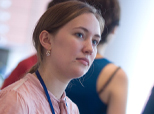
The first-year Gerstner Sloan Kettering core course curriculum has been invaluable for fostering creative and critical thinking. Our discussions of scientific papers in class and of lectures and problem sets outside of class have been both interesting and instructive. Additionally, the combination of lab rotations and clinic visits has exposed me to the necessary preparatory knowledge for future work in my thesis lab.
Our Second-Year Students
The major task in the second year is to begin thesis research, prepare a written thesis proposal, and defend it. This spring nine students reached this milestone.

Neha Bhagwat
Department:
Human Oncology and Pathogenesis Program
Mentor:
Ross Levine

John Halliday
Department:
Cancer Biology and Genetics
Mentor:
Eric Holland

Ellen Hukkelhoven
Department:
Molecular Biology
Mentor:
Andy Koff

Isabel Lam
Department:
Molecular Biology
Mentor:
Scott Keeney

Armine Matevossian
Department:
Immunology
Mentor:
Lisa Denzin

Moriah Nissan
Department:
Human Oncology and Pathogenesis Program
Mentor:
David Solit

Jessica Rios
Department:
Cell Biology
Mentor:
Marilyn Resh

William Walkowicz
Department:
Molecular Pharmacology and Chemistry
Mentor:
David Gin

Elizabeth Wasmuth
Department:
Structural Biology
Mentor:
Chris Lima
Second-Year Students Awarded Fellowships
Two second-year students were named Grayer Fellows for the 2010-2011 year. They are Ellen Hukkelhoven and John Halliday. These fellowships were established by Mr. and Mrs. Jonathan Grayer. Mr. Grayer is a member of the Gerstner Sloan Kettering Board of Trustees and the former chairman and CEO of Kaplan, Inc., which he transformed from a small test prep provider into a global education corporation serving over one million students.
Grayer Fellows are selected based on achieved excellence, as demonstrated by their thesis proposal examinations.
Third Year & Beyond
In addition to continuing their dissertation research, some students select clinical mentors to oversee their clinical apprenticeships. The goal of the Gerstner Sloan Kettering Clinical Apprenticeship is to inspire and encourage students to think about solutions to clinical challenges using their knowledge of basic science. The apprenticeship also helps students learn the clinical lexicon in order to allow them to have meaningful scientific exchanges with clinicians. These goals are met through student engagements with clinical mentors, who provide an important and unique component of our educational program.
Selection of a clinical mentor is guided in large part by the student’s research project. For example, a student studying meiosis might have a clinical mentor who studies and treats patients with germ cell tumors. Similarly, a student studying the Wnt signaling pathway might have a clinical mentor who studies and treats patients with colon cancer.
Below some third- and fourth-year students share their thoughts on the impact of the clinical apprenticeship component of the curriculum.
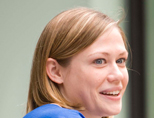
Karen Hunter
Mentor:
Johanna Joyce
Clinical Mentor:
Diane Reidy
My clinical mentor is Dr. Diane Reidy, who is on the GI Service and focuses on neuroendocrine tumors. Because the RIP1-Tag2 mouse I use in my research is a neuroendocrine tumor model, we have been working in collaboration with her and a pathologist, Dr. Laura Tang, to validate our findings in human samples. Dr. Reidy and I have had several useful discussions on my findings in the mouse model and how this relates to patients, as well as some directions to take in my research.
Because neuroendocrine tumors are a rare tumor type, much more research is needed to understand them and to develop better treatments. Dr. Reidy and Dr. Tang are creating a registry of patients and are collecting samples that we will be able to use in future studies. In collaboration with the Moore lab we will be working to derive and characterize additional neuroendocrine cell lines collected from patients seen in the clinic.
In addition to these collaborations, Dr. Reidy and I have set up a schedule where I attend the GI tumor board meetings (where patient cases are discussed) every other week and spend a morning in the clinic once a month. It has been very beneficial to me to see how patients with neuroendocrine tumors are treated. I have also had the opportunity to sit in as patients are enrolled in the registry, and to speak with them about how we use their information and samples to improve understanding of their disease.
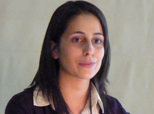
Yvonne Gruber Mica
Mentor:
Lorenz Studer
Clinical Mentor:
Jedd Wolchok
When I first met with Dr. Wolchok in early September, we agreed to start with some clinic visits to generate ideas for our mentorship. He put me in touch with one of his clinical fellows, and I’ve been to the clinic a handful of times since then. One visit took place on a day when Dr. Wolchok was seeing protocol patients. This gave me exposure to some clinical trials that are underway. The clinic visits have been interesting, although I am still searching for information I can apply to my work in the lab.
I expect to see more benefit from my clinical mentorship next year, when my thesis project begins to focus more intently on melanoma. During my first meeting with Dr. Wolchok we had an interesting conversation about open clinical questions related to the classification of melanoma subtypes. The conversation planted a seed that may possibly give direction to the second half of my project. We’ve also discussed the possibility of collaborating in the future.
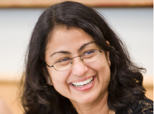
Semanti Mukherjee
Mentor:
Robert Klein
Clinical Mentor:
Zsofia Stadler
For my thesis I will be working to find ways to identify an individual’s genetic predisposition to cancer. I became interested in working with Dr. Zsofia Stadler, a medical oncologist who specializes in the treatment of gastrointestinal malignancies, because she is conducting population genetic studies and is working to translate genome-based cancer risk assessment approaches to the clinic.
We decided to schedule clinical observations and case study meetings twice a month. During my first rotation in January, I shadowed her in the genetics clinic, where she provides clinical counseling for individuals who may have an inherited predisposition to gastrointestinal cancers or other cancer syndromes. During my second rotation, I shadowed genetic counselor Sherry R. Boyar.
Depending on family history and pedigree analysis, Memorial Sloan Kettering assesses and tests patients and their relatives at high risk for known mutations in the p53 gene (Li-Fraumeni syndrome); STKll gene (Peutz-Jeghers syndrome); MENl gene (multiple endocrine neoplasia type 1); MLH1, MSH2, and APC genes (hereditary colon cancer syndromes); and BRCA1 and BRCA2 (breast cancer cases). I have also attended two case study/diagnosis meetings with Dr. Stadler. This offered an opportunity for me to learn how genetic counselors and oncologists discuss their patients’ case histories and diagnosis, and the pedigree analysis.
Overall the experience has been fruitful. Dr. Stadler has agreed to join me in my thesis committee meetings and to advise me on my analysis of clinical data. I am looking forward to working more closely with her in the future.
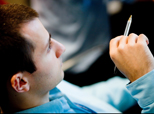
Dimiter Tassev
Mentor:
Nai-Kong Cheung
Clinical Mentor:
Ronald DeMatteo
During initial conversations with my clinical mentor, Dr. DeMatteo, he explained that he had been using Gleevec as an adjuvant therapy for the treatment of gastrointestinal stromal tumor (GIST), and that he was working with Novartis to begin a Phase 2 non-randomized 5-year trial. Because I have a strong interest in clinical investigation he allowed me to sit in on his meetings with Novartis. The experience was extremely helpful. His team came to an agreement with the company about how the trial should be managed and is currently enrolling patients at multiple cancer centers across the country.
Since then, our focus shifted to monoclonal antibodies, which Dr. DeMatteo is interested in using along with Gleevec for the treatment of GIST-bearing transgenic mice. We discussed several experiments that our labs could do together to achieve his goals, and are currently talking about the experimental design. Lately our relationship has become more collaborative and I try to offer assistance to his lab.
New Faculty
The School welcomes immunologist Joseph Sun.